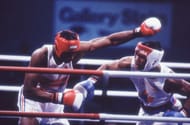Professional boxers are eligible to compete at the biggest sporting event - the Olympics. In 2016, the International Boxing Association allowed the paid boxers to be a part of the Olympics, encouraging the inclusion of the world's best athletes, to take part in the mega-event.
There is a rich history when it comes to fighters leaving a mark at the Olympics before stepping into groundbreaking professional careers, including Muhammad Ali, who won gold at the Rome Olympic Games in 1960.
But, having said that, both amateur and pro boxing have different approaches to the game and could set up extremely dangerous mismatches.
But, there are always two sides to a coin. The benchmark decision has sparked outrage among the fraternity as well as doctors, saying it could be dangerous, confusing, and a 'bloody' idea.
Former gold medallist and world heavyweight titleholder Lennox Lewis termed the decision to be "preposterous" of allowing professionals into the same ring as amateurs.
But all three professionals - Hassan N’Dam N’Jikam, Carmine Tommasone and Amnat Ruenroeng - who took part in the 2016 Rio Olympic Games were defeated in the initial stages of the Olympics.

Reasons for non-participation by pro-boxers at the Olympics
Intensity of the matches
Olympic boxing is still considered amateur level. Even though the AIBA has allowed the pro boxers to take part in the Summer Games, the format of the game is as per the amateur boxers. Thus, making it an uncomfortable place for the pro boxers to compete in.
The main target of a paid boxer is to inflict as many heavy punches as possible to knock the opponent out. Whereas, the amateur's look to score as many points as possible in order to seal the match.
An amateur boxing match lasts for 3 rounds while professional matches can even go for 10 - 12 rounds and sometimes even 15.
Pro boxer's injury scare
Potential injury scare is another major factor why professional boxers do not participate in the Olympics. Amateur boxers who play only three rounds require a different kind of skill set. Their game requires quick movement, powerful punches as well as shorter, faster, and intense competition.
Amateur boxers use their equipment such as headgear, hand gloves, mouth guards, and vests. Whereas, except for gloves and mouthguards, all other safety gears are banned from professional boxing.
All these points make it even more dangerous, more violent, and threatening to see the boxers take to the ring without wearing their usual protective headgear.
Status quo of the pro boxers
The question is what if a professional boxer loses to an amateur? Will they get organizers to sponsor them thereafter?
Future revenue could be another reason why pro boxers do not prefer to compete at the Olympics. A pro boxer's earnings are in the millions, and participating in a competition like the Olympics restricts them to boxing in confined circumstances.
With the AIBA decision being as it is, the choice to compete at the Olympics is eventually in the hands of the professionals in any case.
